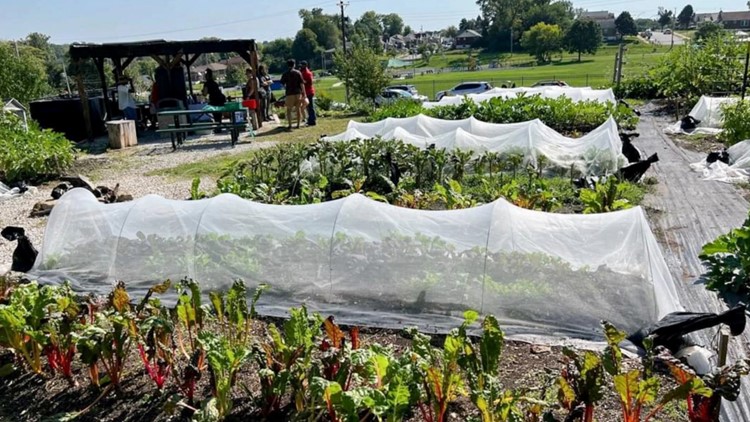ST. LOUIS — Research shows Black residents are nearly twice as likely as white residents to live in census tracts with low access to healthy food.
An estimated 59% of St. Louis City residents are eligible for the Supplemental Nutrition Assistance Program SNAP benefits. Urban farmers like Dail Chambers have multiple farms in North City, she started farming because she wanted her family to have a nutrient-rich diet.
Chambers is also a micro-grant recipient from Food City, the urban farmer has four plots in North City where she grows herbs, and seasonal fruits and vegetables. One of her farms is in the Greater Ville neighborhood where she resides.
“Growing natural food goes beyond WIC it is a more holistic approach,” said Chambers. Not only is the farmer feeding her family fresh fruit and vegetables, but she is also serving and supporting neighborhoods that are impacted by food apartheid.
Sara Bannoura, Research and Storytelling Program Manager for Food City, helps create an inclusive sustainable food ecosystem in the St. Louis Metro Area.
Bannoura said, “food insecurity is financial insecurity.”
“When that is a factor, it influences everything else in your life.”
She paints the picture of low-income families choosing between paying the cost of healthy groceries or childcare. Her research explains how a lack of nutrient-rich diets impacts brain and body development. She explains that the human body becomes fatigued and has low energy.
“Food is energy and medicine, and the body needs to heal if consumed with large amounts of unhealthy foods,” the researcher said.
According to Bannoura’s research, people with diets that are filled with high carbs and unhealthy fats will experience sugar rushes. She describes a sugar rush as a feeling of having a burst of energy and then suddenly crashing and becoming exhausted. Unfortunately, many St. Louisans who live in impoverished communities have experienced this because healthy affordable food options are not a part of their reality, they are living in survival mode. Eating foods that are readily available to them and their families.
USDA data show that 33% of the population is greater than 1 mile from the nearest supermarket, supercenter, or large grocery store for an urban area or greater. And 10 miles for a rural area, this measure shows that an estimated 18.8 million people, or 6.1 percent of the U.S. population, live in low-income and low-access tracts. And are more than 1 mile or 10 miles from a supermarket.
Areas that are primarily north of Delmar for decades have been stricken with economic disparities and usually are flooded with corner stores that serve packaged frozen foods, or fast-food restaurants. This can create a generational cycle of unhealthy eating habits according to the research and storytelling manager.
She describes the neighborhoods as food swamps because food is available but it’s not healthy. Many of these communities receive food from local food pantries and other service-based organizations; however, Bannoura said, “Food pantries are great, but you’re just giving people packaged food, you’re not helping them get out of non-nutritious diets.”
There is some good news, the Urban Harvest 2022 Annual Report shows in 2021 the organization grew almost 3,000 pounds of organic produce across four farm sites, they also distributed over 90% of their produce to their non-profit partners. Overall, this translates to over 2,900 healthy meals distributed to the community.
City farmers like Chambers help combat the packaged food cycle; she grows tomatoes, Swiss chard, okra, blackberries, and raspberries. Her farms grow cabbage, bell peppers, and onions to name a few. Chambers' neighbors and those she serves are so grateful for her farms. “What I’m doing has a direct purpose,” said the farmer.
Bannoura is dedicated to the work done at Food City, “When you look at the data and see people dying before they need to, compared to those in West County. That’s why we’re doing this,” said the research manager.
Following those same sentiments Chambers adds, “It’s about how this food changes the community.”
Ashley Winters is a Report for America reporter for the St. Louis American.


